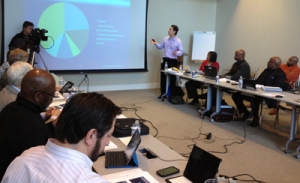Day three of the Board of County Commissioners’ Strategic Planning Conference focused on capital spending planning and priority setting.
Management and Budget Director Hyong Yi and Finance Director Dena Diorio briefed the Board on the list of priority capital projects approved by previous board for 2012, 2013 and 2014.
Historical Perspective
From FY2000 to FY2009 the County issued a total of $2.1 billion in debt. Over that same period, FY2000 to FY2009, the County incurred $2.6 billion in capital expenditures. Annual debt service increased by 115% during that same period. In 2008, departments were instructed not to enter into any contracts requiring capital dollars; capital projects in process were completed and no new projects were initiated; the County issued $191 million in debt and spent $60 million of pay-as-you-go funds to complete ongoing projects. When spending stopped, the County still had $970 million in authorized projects.
The County adopted the following debt management strategies:
- Reduced debt issuance – “debt diet”
- COPS issuance eliminated
- Created debt service fund
- Capped long-term debt issuance $100 million per year
- Pay-as-you-go appropriations totaling three cents on the property tax rate
- No new authorizations for the medium-term
Those actions reduced outstanding debt by 19.3% and capital expenditures dropped considerably. Authorized and unissued debt was reduced by 49.1%.
Current – FY 2014 ranked capital projects total $111 million with total funding at $139.3 million
Next Steps
Capital project ordinances for projects ranked in FY2014 will be presented to BOCC for approval in March. Staff will present financing strategies for FY2015 – FY2017. Continued adherence to financial and debt management policies is a must.
 Priority Setting
Priority Setting
Each year the Board determines its take on community priorities, ranking 48 County program categories into seven levels. Higher ranking doesn’t guarantee a program will get funded but the majority of County spending is on programs in the top three categories. Example: Charlotte Mecklenburg Schools funding, CPCC Education Funding and Debt Service are three program categories in Priority Level One.
- The Board approved moving Non-Communicable illness and Disease Prevention/Treatment from Priority Level three to Level One.
- Adult Mental Illness Prevention & Treatment from level three to Level Two
- Tourism from Level two to Level Three
- Historic Preservation from Level Seven to Level Six
All other program categories remain in last year’s Priority Levels.
Workshop Topics
BOCC has requested and staff will attempt to schedule the follow topics during the Board’s scheduled workshops:
- Joint meeting with CMS
- Department Director introductions
- Community Service Grant overview
- Consolidated Human Services Agency
- HR Policy on termination
- Transportation & Economic Development
- DSS Operational Report
- Health Department Operational Report
- Job Creation
- STEM
- Entrepreneurial Think Tank
- Business Owners Foster Children’s Programs
Commissioner Bentley recommends that Chairman Cotham appoint several subcommittees to study the issues above rather than having the entire Board study each. Hyong Yi feels some of the topics may be best communicated to the Board with a written report from staff and he will recommend to the Board which ones may fall into that category.
Filed under: Uncategorized | Leave a comment »








